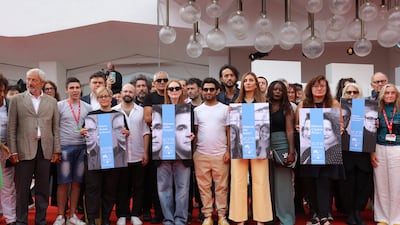Julianne Moore led red carpet protests at Venice International Film Festival on Friday in support of filmmakers detained around the world, as the new feature from imprisoned Iranian director Jafar Panahi was shown.
Panahi, who won the top prize Golden Lion in Venice in 2000, was jailed in July along with two other filmmakers in the latest crackdown on Iranian civil society.
Moore, who is leading the jury at this year's festival, was joined by dozens of other artists, including British director Sally Potter and last year's Golden Lion winner, France's Audrey Diwan.
They held posters that also highlighted the detention of Myanmar filmmaker Ma Aeint and Turkish producer Cigdem Mater.
Despite years of attempts to silence him, Panahi's new film No Bears shows that he has lost none of his searing political critique and wry sense of humour.
The film is partly focused on Iranians in Turkey, trying desperately to emigrate to Europe.

But it also follows Panahi himself in a fictionalised version of his real life, as he struggles to make the film from across the border in Iran, which he was already banned from leaving.
One of the film's stars, Mina Kavani, said she was inspired by his focus, despite having to direct by phone and internet.
"He was in such concentration, he had such perfectionism — as an actress, I couldn't let myself get sentimental," said Kavani, who lives in exile in France.
"All that counted for him was cinema. He just wanted to make his movie. I thought: 'I know now why he's Mr Panahi.'"
In 2010, Panahi was sentenced to six years in prison for "propaganda against the system" following his support for anti-government protests.
The sentence was never carried out but hung over him — and was only enacted in July when he went to enquire about two other filmmakers, Mohammad Rasoulof and Mostafa Aleahmad, who had just been arrested.
Panahi and Rasoulof issued a defiant statement via the Venice organisers last week, vowing to continue making art.
"The history of Iranian cinema witnesses the constant and active presence of independent directors who have struggled to push back censorship and to ensure the survival of this art," they wrote.
Panahi has won the top prizes in Venice (for 2000's The Circle) and Berlin (2015's Taxi), as well as best screenplay at Cannes (2018's Three Faces) — but was unable to accept either of the last two prizes in person.
A second Iranian film is competing for the Golden Lion this week — Beyond the Walls by Vahid Jalilvand — which explores Iran's security state.
Jalivand was cautious in his words at a press conference on Thursday, saying "a balance between the two sides" was needed in Iran today.
"In this movie, the hero is a security official himself. We have unfortunately reached a perspective where it is totally bipolar," he said.
"If we can create the sense of brotherhood, dialogue will become much easier, there will be less violence. This is my true belief and I would still believe this even if I were living in Europe or the United States."






